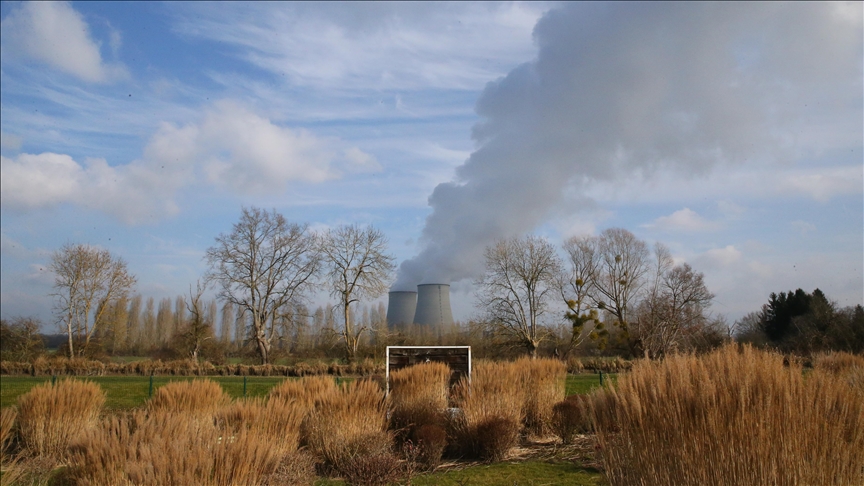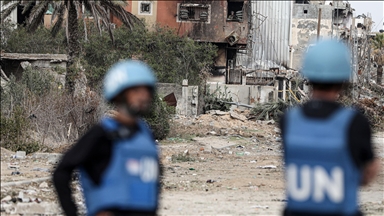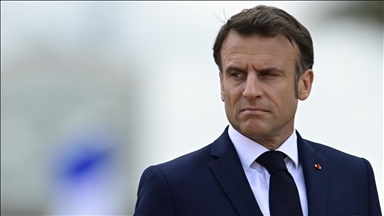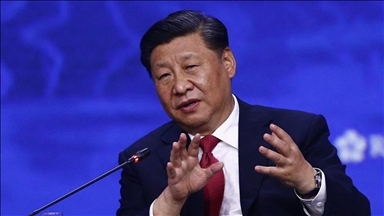France working to double down on nuclear power
At a time when war is back on European soil, continent's gas, electricity supplies more uncertain than ever, France looking for solutions
 Smoke rises from Belleville Nuclear Power Plant, which belongs to French electricity company EDF, in Paris, France on February 09, 2017. ( FILE PHOTO - Anadolu Agency )
Smoke rises from Belleville Nuclear Power Plant, which belongs to French electricity company EDF, in Paris, France on February 09, 2017. ( FILE PHOTO - Anadolu Agency )
NICE, France
After calling on households to be energy sober by adopting economic gestures at their level, the French government has presented at the Council of Ministers a bill to accelerate the construction of new nuclear reactors and simplify the procedures for installation.
The new law, presented on Wednesday, will be debated in parliament in early 2023 and should allow the commissioning of six new EPRs (European Pressurized Reactor) spread over three sites.
President Emmanuel Macron, who had already mentioned his desire to further develop the French nuclear fleet in 2021, wants to go faster, while the country is facing a surge in energy prices coupled with a serious fear of shortage for the coming winter, against the backdrop of the ongoing Russia-Ukraine war.
Almost half of nuclear reactors shut down
Despite the urgency of the situation and the blackout feared by the authorities, out of the country's 56 nuclear reactors, no less than 24 have been shut down, while two at the Fessenheim Nuclear Power Plant had already been closed.
French electricity manager EDF (Electricity of France) shuts down certain power plants during the summer months to make some savings and maintenance operations, but the health crisis that caused repeated confinements had a direct impact on these sites’ maintenance.
Beyond these constraints, EDF is forced to shut down certain reactors for several months during the mandatory inspections held every 10 years.
"These shutdowns last about six months each, and we carry out six to seven per year," EDF recently told Radio France, the company that runs France's radio stations.
The number of reactors shut down during summer reached 32, causing an unprecedented situation and raising concerns to the highest level.
Macron, who had announced in 2018 his desire to close a total of 14 reactors by 2035, had to review his copy in the context of the global energy crisis.
Gov't acting for its 'energy sovereignty'
The new bill on nuclear power was presented on Wednesday morning to the council of ministers with a clear objective, allowing France to get out of foreign dependence on electrical energy.
It "responds to the urgency of the crisis as much as it allows us to look forward," assured the government spokesman Olivier Veran at a press briefing, considering that it is a "sustainable response to the climate’s imperative, energy independence, and purchasing power."
But Matignon (Prime Ministry) is also seeking to reassure those who have reservations about the issue of nuclear development.
It explains that it is "in no way" about lowering the government’ “requirements” in terms of "respect for the environment" and “nuclear infrastructures safety."
"It is not a law that modifies the place of nuclear power in our energy mix," said Veran, adding that it will "accelerate the construction of new nuclear reactors by facilitating and rationalizing a certain number of procedures."
For example, there will be "the possibility of building these new nuclear reactors by the sea, provided that they are in the immediate vicinity ... of existing nuclear reactors."
The government spokesman also promised that "this text guarantees full respect for the principle of public participation" and "for each EPR, there will be at least one public debate and two or even three prior public inquiries."
Associations denounce 'forced passage,' express reservations about new reactors’ impact
But if the prime minister shows a willingness to act quickly and well, the approach remains strongly criticized by environmental and biodiversity protection associations.
"There is total opacity on this subject. Some data on the impact of nuclear power on biodiversity exist internationally, but very little in France. We are trying to do this for wind turbines and photovoltaics, there is no reason why nuclear power should escape our scrutiny," Allain Bougrain-Dubourg, the head of the League for the Protection of Birds (LPO), told the national television TF1.
He particularly fears "the effect of water warming, the turbines that capture many small organisms, the impact on birds of aerial installations or pylons installed at the exits of power stations."
French anti-nuclear associations network also points to "the policy of fait accompli conducted by EDF and the government for years."
"How can we hope that the opinion of citizens will be heard if, at the same time, Emmanuel Macron assumes a forced development of nuclear power?” it asked.
The network has adopted a "firm and uncompromising" position on this issue, which consists of rejecting the idea of "new reactors in the country" or the "extension of existing reactors."
Despite a declared desire for consultation, the government is already planning to present the text to the parliament at the beginning of 2023, with the aim of commissioning new reactors in 2035 or even 2037.
*Translated by Aurore Bonny









